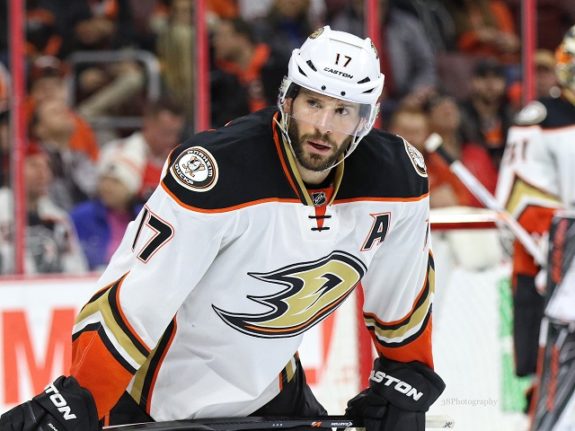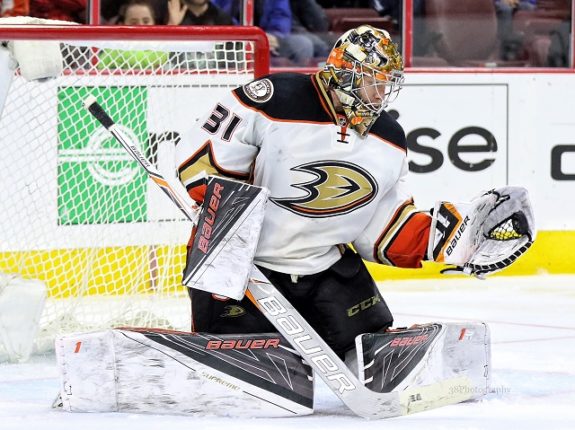In an era with several legitimate Stanley Cup runs, some are remembered more than others. After securing the franchise’s first Cup in 2007, the Anaheim Ducks spent most of the 2010s in a tremendous position to win their second. Few teams dominated the regular season as much as the Ducks, who won five straight Pacific Division titles from 2012-13 to 2016-17.
But for as great as they were in the regular season, this era of Ducks hockey is remembered for what could have been. By the time the Nashville Predators smothered a depleted Ducks squad in the 2017 Western Conference Final, the narrative established was the Ducks were a great team that folded at the first sign of adversity in the playoffs. This era is defined by Game 6 disappointments and subsequent Game 7 heartbreaks. Of these heartbreaks, the 2014-15 season remains the most painful reminder from an era of missed opportunities.
Ducks Dominate Their Way to Western Conference Final: Getzlaf, Perry, Kesler
The 2014-15 Ducks team finished the regular season with 109 points and was the top seed in the Western Conference. The veteran core consisted of Ryan Getzlaf, Corey Perry, and Ryan Kesler, all still playing at a high level. Joining them were fan favorites of the era, including the likes of Ben Lovejoy, Kyle Palmieri, Francois Beauchemin, and Pat Maroon. Rounding out the roster were a handful of younger players who took big steps in their development in 2014-15. Jakob Silfverberg, Hampus Lindholm, Cam Fowler, Rickard Rakell, and Josh Manson are all integral parts of the current Ducks’ roster, but were all under the age of 24 during the 2015 playoffs.

Anaheim cruised through the first two rounds of the Stanley Cup Playoffs, sweeping the Winnipeg Jets and defeating the Calgary Flames in five games. Getzlaf, Perry, and Silfverberg were all averaging over a point per game, and goaltender Frederick Andersen had a .924 save percentage through the nine games. These playoff appearances for the Jets and Flames were the first in several years for either franchise; however, the Chicago Blackhawks had no shortage of playoff experience during this era, with two Stanley Cups within the previous four seasons.
A Back-and-Forth Western Conference Final Against Blackhawks Dynasty
The Ducks took the first game of the series, 4-1, though the final score fails to mention it was 2-1 with only eight minutes left to play. Neither team could take a stranglehold on the series, as the teams alternated wins in each of the first five games. Games 2 through 5 were all decided by a single goal, with three of those games needing overtime. The most memorable moment from this “series within the series” was when the Ducks scored three goals in 37 seconds to flip a 3-1 deficit to a 4-3 lead late in Game 4. But Patrick Kane scored a power-play goal to force overtime, and Antoine Vermette won it for the Blackhawks in double overtime to tie the series, 2-2.
The Ducks would take a 3-2 series lead, but the rest of the series ran off the same script as the years prior. The Blackhawks held the Ducks at arms-length in Games 6 and 7, capitalizing off early goals and holding off any comeback effort. The Ducks, for the third straight season, had two chances to advance in the playoffs and failed.

With the benefit of hindsight, the Ducks’ best chance at taking the series would be to not allow it to reach Game 6. The aforementioned stretch of games between Game 2 and Game 5 was split by both teams with two wins apiece. Hockey is a low-scoring game played on ice and is consequently susceptible to weird bounces, penalties, and other unscripted oddities. But somehow, nothing went the Ducks’ way in their losses in Games 2 and 4, despite needing multiple overtimes in both games. Game 2 was just as much of a missed opportunity as Game 4, without the fireworks. The Ducks gave up two power-play goals in the first seven minutes of the game. They would eventually tie the game and force overtime. Marcus Kruger would eventually win it for the Blackhawks in triple overtime, after 116 minutes of being shut out at even strength. If anything changes, the Ducks could have easily had a convincing 2-0 series lead. Instead, the series went back to Chicago tied.
2015 Was the Ducks’ Best Chance at a Cup in an Era of Repeat Winners
Part of the frustration in losing the way the Ducks did throughout the decade was that the Stanley Cup was only shared by a handful of teams during the era. From 2010 to 2017, the Blackhawks, Los Angeles Kings, or Pittsburgh Penguins won the Cup in seven out of eight years. In 2018, the equally hard-luck Washington Capitals won their first Stanley Cup, an overdue reward for a team often considered to be among the best in the league from year to year. The Ducks were swept out of the playoffs in the first round that season, and the race to the bottom of the standings began.
Related: Ducks News & Rumors: Comtois, Terry & More
The Blackhawks and Kings have fared similarly to the Ducks over the last few seasons, as it often goes with championship teams — the cost of keeping a championship window open usually necessitates a future of cost-cutting and prospect rebuilding. The Ducks had to go through all of the pains of winning a Stanley Cup, only without a Stanley Cup to look back on.